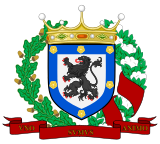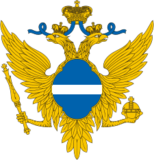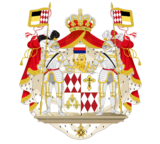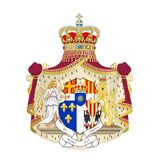Draft:Empire of New Holland
 | Draft article not currently submitted for review.
This is a draft submission. It is not currently pending review. There are no deadlines as long as you are actively improving the submission. Drafts not being improved may be deleted after six months. Note: The submission-received box will appear at the top of the page. If it's there, your draft has been submitted correctly.
This draft has not been edited in over six months and qualifies to be deleted per CSD G13.
Where to get help
How to improve a draft
You can also browse MicroWiki:Good articles to find examples of MicroWiki's best writing on topics similar to your proposed article. Improving your odds of a speedy review
Last edited by HollFedGov (talk | contribs) 11 months ago. (Update) |
Empire of New Holland | |
|---|---|
| Motto: "IMPERATOR ET POPVLVS AVSTENASIÆ" | |
| Anthem: "God Save the Emperor" | |
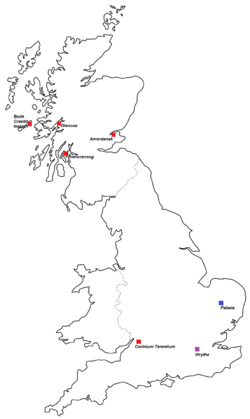 Austenasia within Great Britain: Greater Wrythe in purple, Palasia and Amerdansk in blue, and the Territories in red. | |
| Capital | Eden's Gate |
| Largest city | New Crete (by land area) Eden's Gate(by population) |
| Other languages | English |
| Religion | Catholicism |
| Demonym(s) | Hollandite |
| Government | Constitutional parliamentary monarchy |
• Monarch | HIM Emperor Justus I |
| Prince Kenedi Duku, Prince of Africa | |
| Legislature | Privy Council of New Holland |
| Establishment | 20 November 2023 |
| Area | |
• Total | 1.000405 sq mi (2.59104 km2) |
| Population | |
• 2023 census | 6 |
| Currency | Australian Dollar ($) (AUD) |
| Time zone | UTC -8, to +10 |
New Holland, officially the Empire of New Holland, is an autonomous territorial entity that exists for the purpose of a political simulation[1] but is more commonly referred to as a micronation by external observers.[2] Founded on the Continent of Australia, New Holland declared its simulation's Commencement in November 2023.[3] It is an enclave and exclave country, consisting of Two non-contiguous pieces of land: Both Within Australia.
History
Reign of Justus I
At 11:30am on 20 November 2023, the town of Eden's Gate and New Crete declared independence from the Commonwealth of Australia as the Empire of New Holland. Emperor Justus I was unanimously proclaimed the nation's first Monarch, and Prince Kenedi Duku, Prince of Africa was unanimously proclaimed the first Prime Minister. A Declaration of Independence was Never sent as the nation exists only for a simulation.[4]
| Flag | Arms | Picture | Name | Annexed | Population | Official(s) | ||||||
|---|---|---|---|---|---|---|---|---|---|---|---|---|
| Cities | ||||||||||||
| N/A | 
|

|
Eden's Gate | 20 January 2023 | 2 | Representative HIM Emperor Justus I |
Mayor HIH Emperor Father Terry | |||||
| Towns | ||||||||||||
| N/A | N/A | N/A | N/A | N/A | N/A | N/A | N/A | |||||
| Territories | ||||||||||||
| N/A | N/A | N/A | N/A | N/A | N/A | N/A | N/A | |||||
| Crown Dependencies | ||||||||||||
| N/A | N/A | N/A | N/A | N/A | N/A | N/A | N/A | |||||
Government
New Holland is an imperial monarchy ruled by the House of Austen. The Throne is officially hereditary.
HIM Emperor Justus I is head of state as Monarch, and holds vast executive, legislative, and judicial powers. He is held accountable by the New Holland Privy Council, a body that can pass advisory resolutions and ultimately has the power to depose the Monarch should they be considered incapable of ruling. On a daily basis, most executive power is exercised by the Monarch and Council of New Holland, with the Prime Minister helping to coordinate the activities of Council in accordance with policies decided by himself and the Monarch. Legislative power is vested in Parliament, which is comprised of the Monarch, Prime Minister, and House of Representatives. The judiciary is comprised of an Imperial Court, to try differing degrees of crimes, with the Monarch issuing sentences for those found guilty.
The part of Austenasia under the control of the central government is split into administrative districts of one City and ten Towns, each run by a Council of 3-20 people, and sixteen Territories, uninhabited areas of land in which law is when possible enforced by a Governor. In practice, Town and City Councils generally tend to desist from formally making any but basic and emergency bye-laws, with local government tending to function more on a communal consensus basis. All Representatives make up the House of Representatives, out of which is elected by universal suffrage the Prime Minister no less often than every four years. The Prime Minister and House of Representatives propose, debate and reword laws to be passed. They are then given Imperial Consent by the Monarch, entering them into law.
The Empire of Austenasia also contains sixteen Crown Dependencies, which fall under the direct and absolute authority of the Monarch, with Governing Commissioners usually being appointed to represent him and exercise his power. Acts of Parliament and other Austenasian laws do not apply to Crown Dependencies unless explicitly stated, with the Governing Commissioners exercising near-absolute domestic power.
Almost half of all Austenasians - 48.3% - do not live within Austenasia itself, instead holding the status of non-residential subjects. They are grouped into four Divisions, each of which also elects a Representative to Parliament.
Ministries
The following Government Ministries are headed by ministers who comprise Cabinet:
- Home Office - led by the Home Secretary, responsible for maintaining communication between the central government and local authorities, keeping a census of all residents and subjects of Austenasia, supervising the running of the State Intelligence Agency, and protecting the environment of the Empire.
- Treasury - led by the Chancellor, responsible for managing the income of the Empire through fundraising and legal fines, and for the financial policy of the Empire.
- Foreign Office - led by the Chief Ambassador, responsible for maintaining diplomatic relations with other nations.
- Ministry of Defence - led by the Minister of Defence, responsible for the implementation of government defence policy and, together with the Treasury, the funding of the Austenasian Armed Forces.
- Ministry for Culture - led by the Minister for Culture, responsible for promoting and preserving Austenasian culture.
- Ministry of Justice - led by the Attorney General, responsible for providing legal advice and services to the Government and supervising the running of the Austenasian Police.
Members of the Government
-
Dame Brianna Stokely, DOB:
Minister of Defence
Representative of North Nahona -
The Hon. Sir Isaiah Burdette, OAO:
Attorney General
Representative of the New World Division -
Lord İsmetcan Saraç, Count of Bithynia:
Representative of Chalcedon -
Lord Michael Simpson, Count of Occibrazos:
Representative of Procyon
Governor of Florencium Carolina
Governor of Elliessium Colorandum
Governor of Golcondiaurum
Governor of Rubrum Beryllium -
Lord Juan Aleges, Baron of Valens:
Acting Representative of Valens -
Lord Michael Colquhoun, Baron of Chandler:
Representative of Chandler -
H.E. Professor Sir Sanjib Bhattacharya, KOB, KCA:
Representative of the Asia Division -
The Hon. Dr Kalin Yanev:
Representative of the Europe and Africa Division -
Lord Casper von Naveria, Count of Cowyetton:
Governor of Peach Ponds -
HSH Prince Edward I:
Governor of Nikaia -
Lord Hunter Prater, Duke of Dixie:
Governor of Travarn
Governing Commissioner of New Flat Rock -
Lord Dominik Kądziołka, Baron of Nervenston:
Governor of Nervenston -
H.E. Akka Bey:
Governing Commissioner of Enfriqua -
The Rt Hon. Patrick-Dylan Knox:
Governing Commissioner of Dekker -
The Rt Hon. Ketan Uzagi, OAO:
Governing Commissioner of Imperia -
H.E. The Rt Hon. Sir Hugh McFarlane, KCA:
Governing Commissioner of New South Scotland -
The Hon. Ashley Jaax, CAO:
Governing Commissioner of Kingeston -
Pun Watta:
Governing Commissioner of Dinkeaw -
Mykolai Oliynyk:
Governing Commissioner of Chersoneses -
Winston Churchill Jr.:
Governing Commissioner of Navurania -
Soumyadip Sengupta:
Governing Commissioner of Ganapati Vihar
Law and order
Law enforcement in the Empire of Austenasia is the responsibility of the Austenasian Police. Jurisprudence operates on a civil law legal system, with crimes being tried by a Town Court, a High Court, or the Imperial Court, depending on the severity of the offence. There are no permanent courts due to the rarity of crimes, with instead a court of the necessary rank to be summoned upon a person being charged with a crime. If a person is found guilty of a crime, then their punishment is decided by the Austenasian consuls. Civil disputes are resolved by a magistrate appointed by the Monarch, Prime Minister or Attorney General.
Austenasia has an extremely low crime rate. Since September 2008, only two arrests have ever been made, both on the same person, the then Princess Caroline (the first time for her part in the Skirmish of the Treasury and the second time for announcing an intention to overthrow the Emperor). The Austenasian Police once unsuccessfully attempted to arrest Lord Marshal William for rebellion and treason after he declared war on the Esmondian government, but he was granted amnesty and pardon at the end of the war.
Only three trials have ever taken place in Austenasia: Parliament vs. HIH Princess Caroline on 31 May 2009, The Imperial Majesty vs. HIM Emperor Jonathan I from 13–19 January 2016, and The Imperial Majesty vs. Lady Sophia Albina from 26–27 June 2021.
Capital punishment in Austenasia was outlawed on 13 December 2008, and this abolition was reaffirmed both on 21 March 2009 and 20 September 2011. The only sentences ever given in Austenasia so far have been temporary exile and unpaid community service.
Law enforcement in the Empire is assisted by the State Intelligence Agency (SIA), a covert and secretive organization which gathers information about domestic and foreign threats. The SIA was founded in 2009, but its existence was not officially acknowledged until 2017.
Military
The Austenasian Armed Forces are the military of the Empire of Austenasia, administrated and partially funded by the Ministry of Defence. The Monarch is commander-in-chief of the military, and Lord Hunter Prater serves as Minister of Defence.
Between May 2009 and June 2020, Austenasia had a standing army which at one point counted 50 members. However, a prolonged peace since the War of the Orlian Reunification at the end of 2010 and many nominally enlisted soldiers falling out of contact with the government over the subsequent decade led to the Armed Forces Act 2020 being passed on 17 June of that year, by which the regular standing army was abolished. The Austenasian Armed Forces now consist of the Limitanei (local reserve militias), the Comitatenses (field armies which may be raised by the national government in times of war) and the Imperial Guard (the standing bodyguard unit of the Monarch).
Demographics
Population
Austenasia has a total population of one hundred and forty five people. Seventy five of these are residents registered as living in Austenasia, and seventy are non-residential subjects who are entitled to vote in general elections and to hold the status of an Austenasian national despite not officially living within the Empire, due to having been granted the status by Parliament for various reasons or having subsequently moved away from Austenasian land claims. Those residents which are over the age of sixteen years hold the status of subject, meaning that they can vote in general elections and have more rights in regards to partaking in local government. Subjectship is sometimes also granted by Parliament to a limited number of younger residents should they hold governmental positions.

On 12 November 2008, Act 20 (Honorary Subjects) was passed, creating the status of Honorary Subjects, to be bestowed by the Secretary-General on applicant non-Austenasians. The number of Honorary Subjects reached 100 on 5 May 2012 and 500 on 21 August 2020. There are currently 640 Honorary Subjects of Austenasia, residing in every continent on Earth other than Antarctica.
Languages
English is the most commonly spoken language in Austenasia, known and used daily by the majority of the population. English is generally the only language used for government business, although some Latin is rarely used for more ceremonial occasions. There are exceptions to the dominance of English in Austenasia. In Enfriqua, French is the vernacular; Marathi in Imperia; Turkish in Chalcedon and Trebizond; Ukrainian in Chersoneses; Estonian in Oppidum Tubae; Mandarin Chinese in Shuhan; and Dutch in Helinium.
Culture
Imperium
Since the reign of Esmond III, a world-view often known as the Imperium theory has grown in popularity within Austenasia, being partially adopted by official legislation during the reigns of Jonathan I and his predecessor. This worldview, which is both officially and popularly adhered to by the other Carshalton Nations and also particularly prevalent amongst the Austenasian Armed Forces, attaches significant importance to the title "Emperor", viewing the Austenasian Throne as being in succession to that of the Roman Emperors. This has helped accelerate the increase of monarchical authority in Austenasia and also resulted in several Roman elements being adopted by the Empire, such as a Latin national motto loosely based on SPQR, the institution of a Senate and of annually-appointed consuls, and - most openly - the inclusion of "Emperor and Autocrat of the Romans" in the official style of the Monarch.
Religion

Since 21 June 2017, Austenasia has been an officially Christian country. Only baptised Christians are eligible to inherit and hold the Throne, Christian feast days are celebrated as public holidays, and Christian symbols are used for example in the national coat of arms. However, freedom of Austenasians to choose and practice their own religion has been guaranteed by law since December 2008, and is entrenched under Article XII, Paragraph C of the Constitution.
From the founding of Austenasia in September 2008 until the introduction of the first non-residential subject in April 2010, the entirety of Austenasia's population identified as Methodist Christians. As more people joined Austenasia, the proportion of Methodists with Austenasia declined, and Methodism is now professed by less than 5% of the population.
Out of all Austenasian subjects and residents, over five-sixths profess belief in a religion and less than a sixth identify as atheist or agnostic.
As of July 2021, roughly two thirds of Austenasians (64.66%) identified as Christians. The main other two religions are Sunni Islam and Hinduism, the practitioners of which together made up 15.5% of the population.
Media
Residents of Austenasia's enclaves read newspapers imported from and watch television channels broadcast from their neighbouring countries. The Austenasian Times is the semi-official Austenasian news service, founded by Jonathan I in November 2012 while he was still Crown Prince.
Austenasia has its own broadcasting corporation, Austenasian Television Productions (ATP). ATP, founded in December 2008, as well as publishing the Prime Minister's Broadcasts, also produces films for two series - Austenasian Events, small documentaries which record events concerning the Empire, and Cool Barbie, a sci-fi fantasy drama about a Barbie's encounters with extraterrestrials and villains in a world where toys are alive. All of these films are published on the ATP YouTube account, where they can be viewed free of charge. The former Lord Charles C. also produced Austenasian videos which he published on his website, Grinning Kettles. These videos were stop motion animated and contained surrealism and nonsense. Bogeyshire is a web series that includes four of these videos and Die Fairgrassen! is one other of said videos.
Notes
References
- ↑ "Frequently Asked Questions", Empire of Austenasia, Retrieved 15 October 2011
- ↑ [[w:List_of_micronations "List of micronations", Wikipedia, the free online encyclopedia], Retrieved 15 October 2011
- ↑ "List of Micronations by Date Founded", MicroWikia, Retrieved 4 November 2011
- ↑ "History of Austenasia", Empire of Austenasia, Retrieved 15 October 2011






